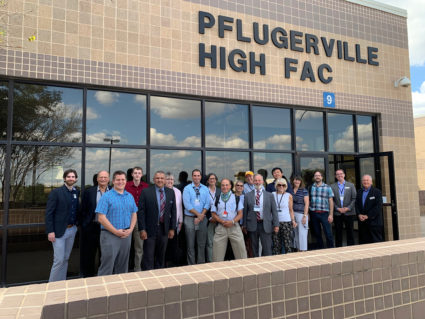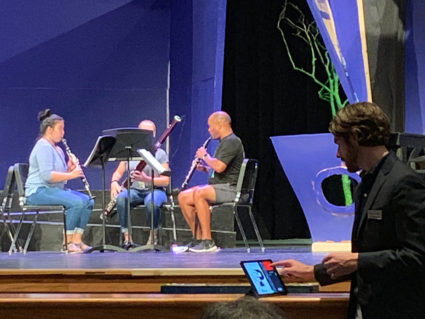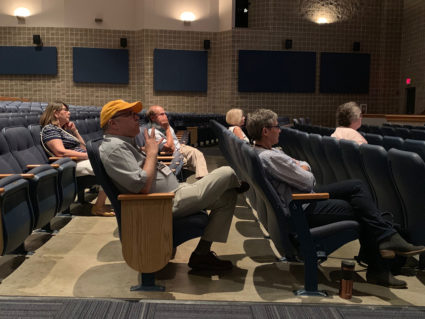Transcend™ and Virtual Acoustics: HEARING is Believing
 When it comes to virtual acoustic technology, you need to hear it to believe it. And that’s exactly what happened at ICFAD’s 56th Annual Conference in Austin, Texas.
When it comes to virtual acoustic technology, you need to hear it to believe it. And that’s exactly what happened at ICFAD’s 56th Annual Conference in Austin, Texas.
Since 1964, the International Council of Fine Arts Deans has focused exclusively on issues impacting Deans and Associate Deans of all creative areas in higher education, including the performing arts. As proud sponsors of ICFAD, Wenger Corporation was excited to host a Pre-Conference Workshop showcasing virtual acoustics and its impact on performance venues. As part of the event, Manuel (Manny) Gamez and Brandon Marks shared their personal experiences with the Transcend Active Acoustic System at Pflugerville High School.
An Innovative Solution for a Common Problem
West Texas is home to the Pflugerville Independent School District (PfISD). But, Gamez, Director of Fine Arts at PflSD, knew their performing arts program had a problem: An acoustically “dry” auditorium.
“The main challenge in our space was the ability [for the audience] to hear clearly what was being presented on stage,” Gamez said.
This is a common issue in school auditoriums across the country, especially where one space serves many types of fine arts programs. Unfortunately, what works acoustically for a lecture or theatre production doesn’t provide similar results for a band, orchestra, or choir performance.
“We needed a solution that would better serve nearly 2,000 students, district-wide events, and the broader community,” Gamez said. “And, building a new auditorium wasn’t an option.”
Cue the Transcend Active Acoustic System.
The Transcend Active Acoustic System and PflSD
Transcend is a groundbreaking system created in partnership with the audio experts at HARMAN, an industry leader in digital signal processing technology. Our system uses a network of strategically placed microphones and speakers along with advanced digital signal processing to simulate the acoustics of nearly any venue at the touch of a button. To see – and hear – Transcend in action, Gamez visited Wartburg College in Waverly, Iowa.
“There wasn’t a bad seat in the house!” Gamez said. “I also saw firsthand how easy Transcend was to use. It really offered an easy solution for improving our acoustics, and it could create more flexibility in our performance space at the same time.”
 In 2017, Wenger went to work at Pflugerville High’s Fine Arts Center (FAC). FAC uses this 1,000-seat auditorium for theatre performances, band and choir concerts, music camps, dance and talent competitions, prom fashion shows, and more.
In 2017, Wenger went to work at Pflugerville High’s Fine Arts Center (FAC). FAC uses this 1,000-seat auditorium for theatre performances, band and choir concerts, music camps, dance and talent competitions, prom fashion shows, and more.
First, our experts examined the space and listened to the natural acoustics. Then, they created an even drier acoustic environment by switching out ceiling tiles over the seating area. The last stage of the process involved installing four microphones, a network of 23 wall-mounted loudspeakers, 34 overhead speakers, and four in-ceiling subwoofers.
The administration chose seven acoustical presets to replicate venues that include:
- Voice Lift (Lecture Hall)
- Recital Hall
- Large Hall
- Medium Auditorium
- Large Auditorium
- Concert Hall
- Cathedral Hall
While acoustically treating a room can be complex and costly, it can make a huge improvement to a venue’s sound. But, once you hear it in action, it’s easy to appreciate the value of an acoustic upgrade.
 In addition to seeing Transcend in action, ICFAD workshop attendees were able to learn more about Wenger products, from traditional room treatments to more complex systems, like Transform™ acoustical banners.
In addition to seeing Transcend in action, ICFAD workshop attendees were able to learn more about Wenger products, from traditional room treatments to more complex systems, like Transform™ acoustical banners.
“Transcend has helped make Pflugerville High School the district’s flagship facility for many of its activities and performances,” Gamez said. I wouldn’t have believed what a difference it could make if I hadn’t heard it for myself in person. I hope this workshop and our demonstration gave other arts administrators a similar experience.”



